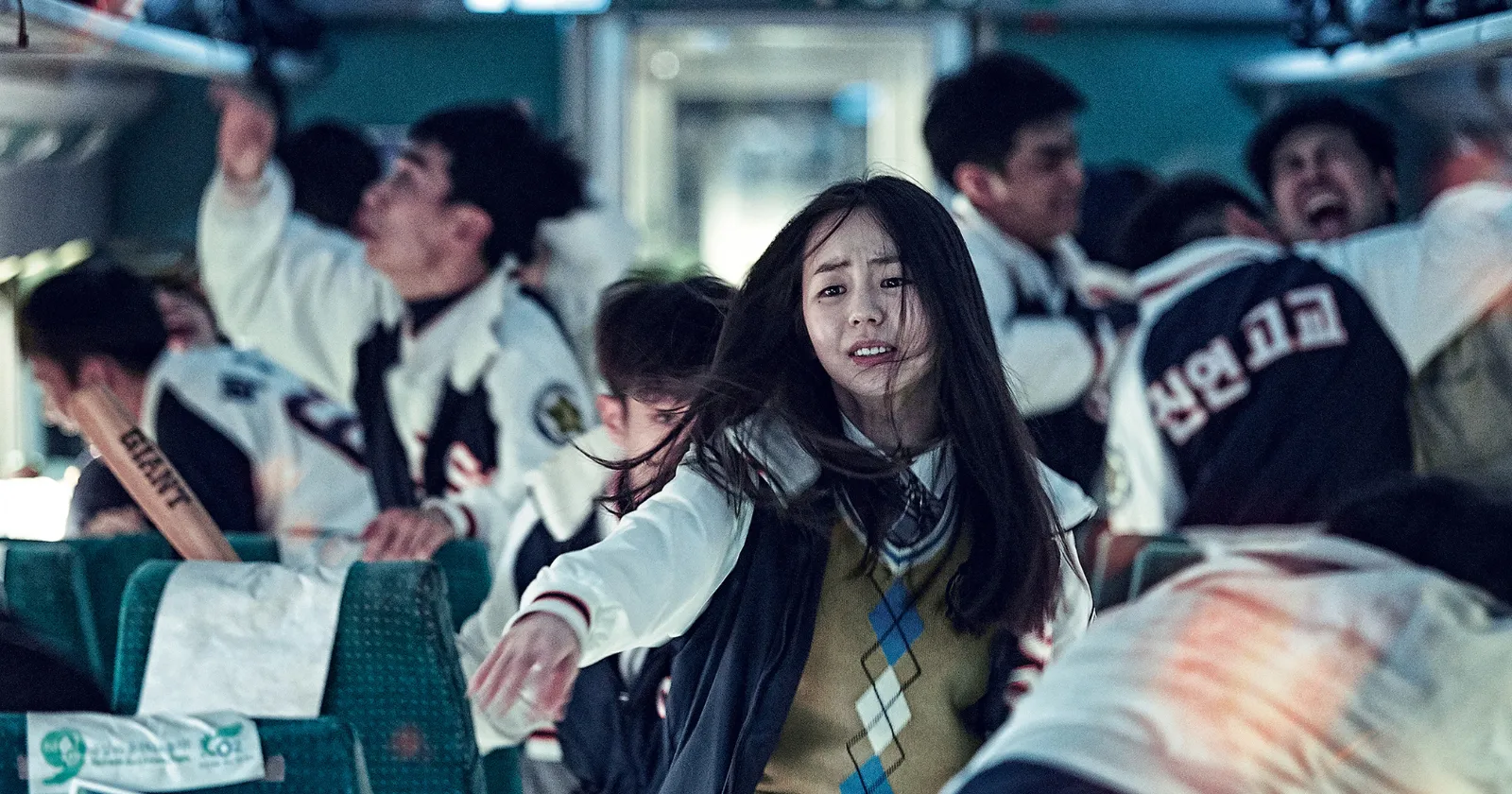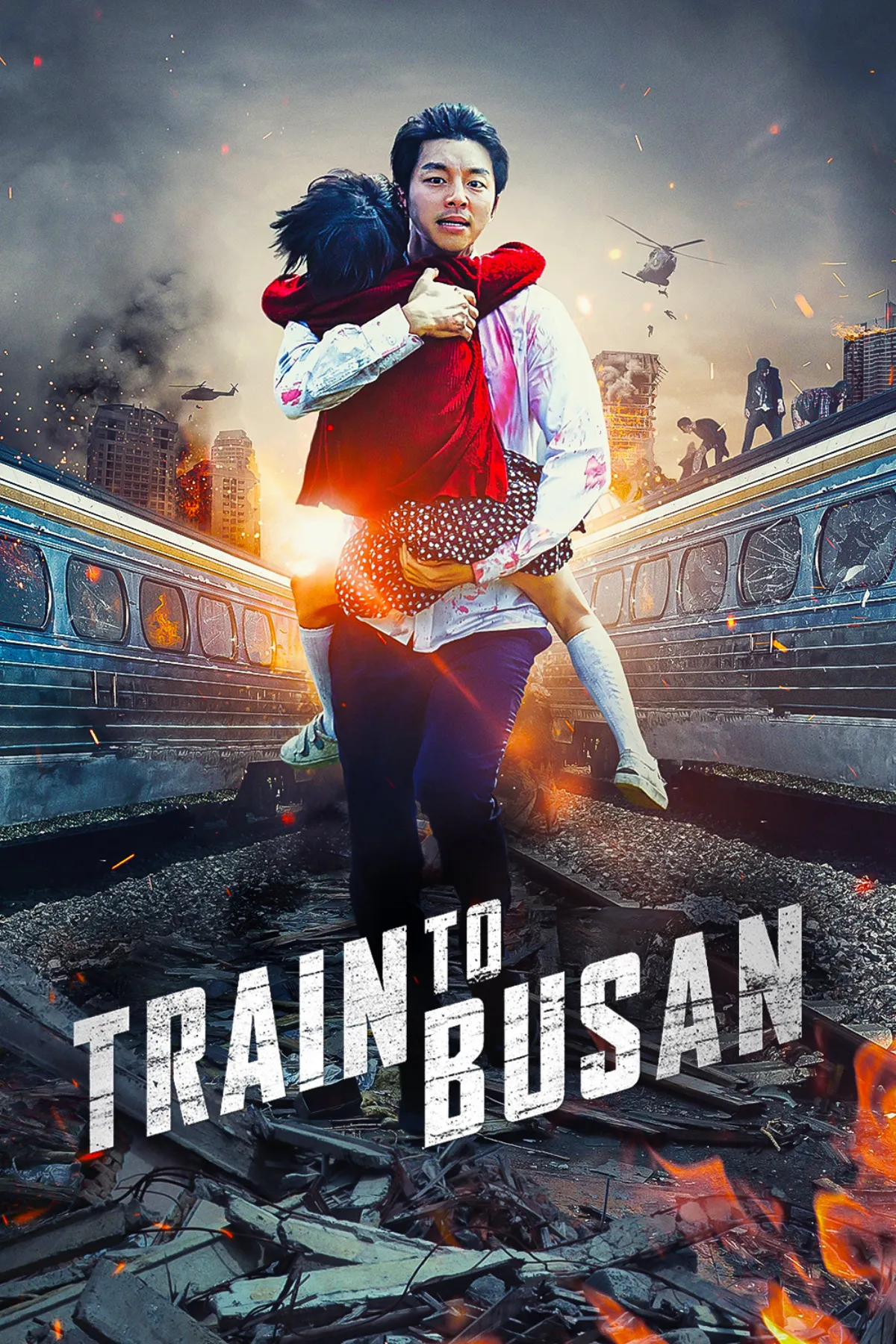Movie Review: Yeon Sang-ho’s Train to Busan is a visual feast as survivors band together on a speeding bullet train. It delivers the right amount of thrills and action set pieces. Although the dramatic elements and character development may seem underbaked, the film rarely faulters and crashes off course.

Genre: Action, Horror, Sci-Fi, Thriller
Train to Busan is the breakout classic from South Korean filmmaker Yeon Sang-ho. This movie has always slipped through my peripherals, but with a new directorial project from the filmmaker JUNG_E hitting Netflix this week, I finally set aside the time to check out a few of his earlier works. Yeon is also responsible for the limited series Hellbound, which also premiered on Netflix in 2021, so at this point he’s worked quite a bit within genre conventions.
His films work at breakneck speed to quickly introduce their premises and characters. Train to Busan doesn’t linger too much on the fraught relationship between Seok-woo (Gong Yoo) and his young daughter Su-an (Kim Su-an, who breaks barriers as an emotionally riveting and believable child actor). The zombie elements don’t necessarily breathe new undead life into the vicious animals, but they also get just enough backstory to make the whole thing work.
Before you know it, Train to Busan is, you guessed it, on a speed bullet train to Busan. When one sickly individual manages to sneak on the train at the last second, chaos ensues and the trip quickly turns deadly for Seok-woo and Su-an. They band together with a few other survivors in order to prepare for the best step forward. Quickly though, the survivors realize that they might be each other’s biggest threat against lasting through this nightmare.
For about the first half of Yeon’s 2016 international hit, Train to Busan is firing on all the right cylinders. The character relationships offer just enough to be believable and relatable. Each shot is packed with dense layering – whether it be the big action set pieces of gnarly zombie violence or the cold open killing of a sacred deer. There’s enough to feast on if you’re an astute viewer as Train to Busan feels like a wholly original zombie experience in a genre that’s been tried over and over again.
Yet in the first half, the best moments of Train to Busan happen when the band of survivors are roaming outside of the bullet train. Although the Snowpiercer-like elements of a segmented train are far more interesting than the Bong Joon-ho instance, it doesn’t amount to much beyond being a segue into a few action sequences that don’t necessarily pay off. When the group leaves the bullet train to investigate a city neighboring Busan, the film kicks it into high gear for one of the best visual spectacles of the 2010s.
I’ve consumed a fair share of zombie content in my life. Zombieland and The Walking Dead were frequently on in my household as I grew up. I appreciated how “Train to Busan” manages to rip from the same cloth of monstrous storytelling, while still finding its own individual pocket. I’ve never seen anything quite like Train to Busan. The establishing shots are gorgeous and lively, the bubbling sense of despair is palpable, and the zombies are terrifyingly vicious. As a genre entry, it hits every important beat that I expect and want from a story like this.
But at the same time, Train to Busan attempts to explore company malpractice and individual faults on creating this virus. At times, the sentiment makes for powerful character reflection, but it often feels underbaked and tossed to the side for big action set pieces. I can’t blame the film or filmmaker for this – the action is just too damn interesting to leave it alone. But for a film that is trying to build Seok-woo into this villainous-turned-heroic businessman, it often feels discarded and thin.
The young daughter Su-an is left to carry much of the film’s emotional weight, and she delivers quite immensely. I’ve never been a big believer in the practice of child acting. It pulls me out of movies far more than it makes me more emotionally invested in them, but sometimes these rules are just meant to be broken. Kim Su-an is incredibly believable and emotionally effecting in Train to Busan – and in a way, kind of makes the movie. The emotional climax of the film relies heavily on her powerful performance, and she lands the plane about as well as I’ve seen from a actress her age.
Train to Busan may not have been quite as gonzo and belligerently unrelenting as I hoped or dreamed of, but it’s still a lot of fun. There are a few giant set pieces that work wonderfully and the performances land quite a punch at the end. It’s easy to see why Yeon Sang-ho has been given a decade’s worth of budgets to make his own genre pieces because I would surely take a “Train to Busan” from him once a year.
Train to Busan Movie Cast and Credits

Cast:
Gong Yoo as Seok-woo
Kim Su-an as Soo-ahn
Jung Yu-mi as Sung-gyeong
Ma Dong-seok as Sang-hwa
Choi Woo-shik as Yeong-gook
An So-hee as Jin-hee
Crew:
Director: Yeon Sang-ho
Writer: Park Joo-suk
Cinematography: Lee Hyung-deok
Editor: Yang Jin-mo
Composer: Jang Young-gyu